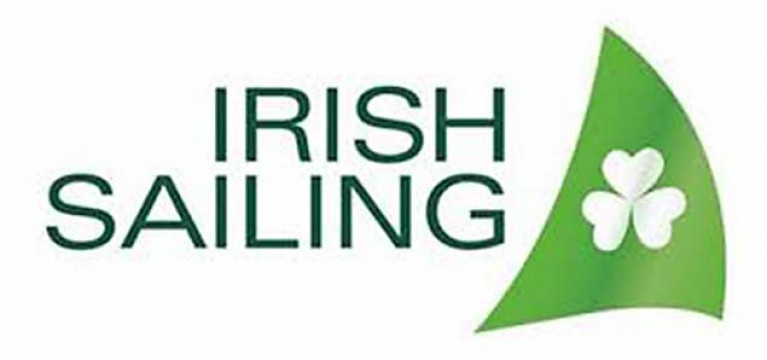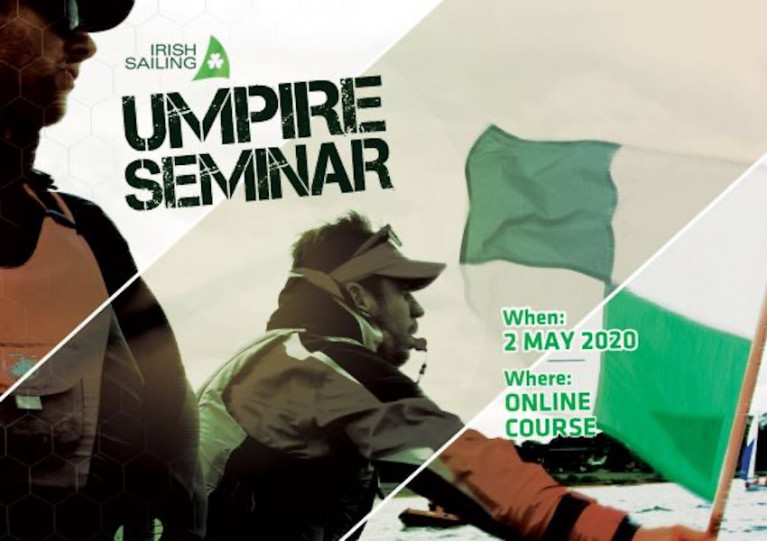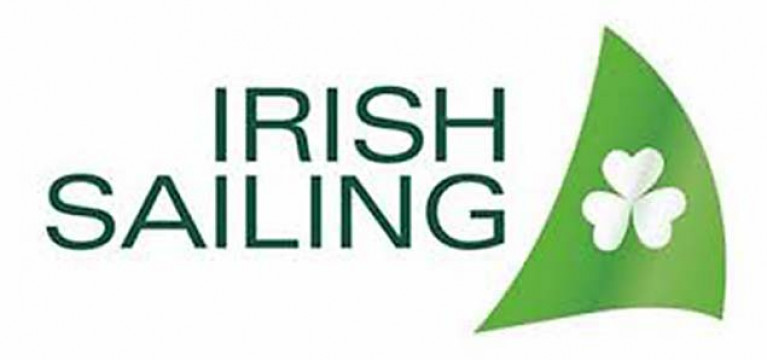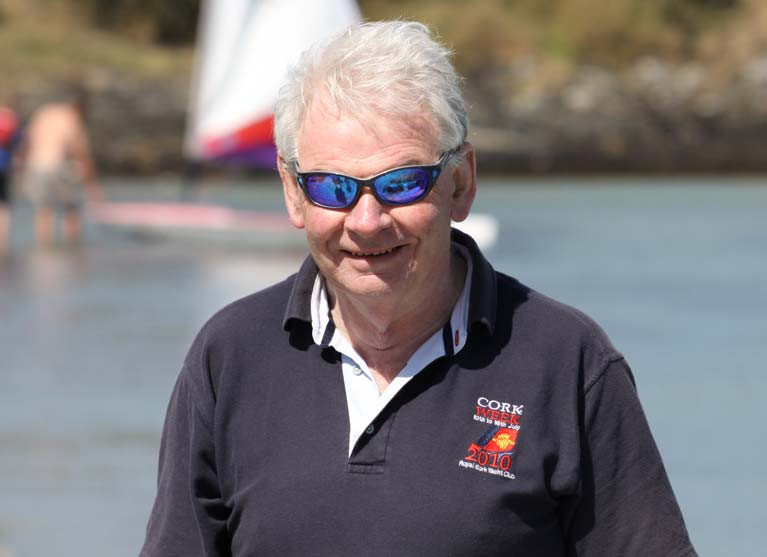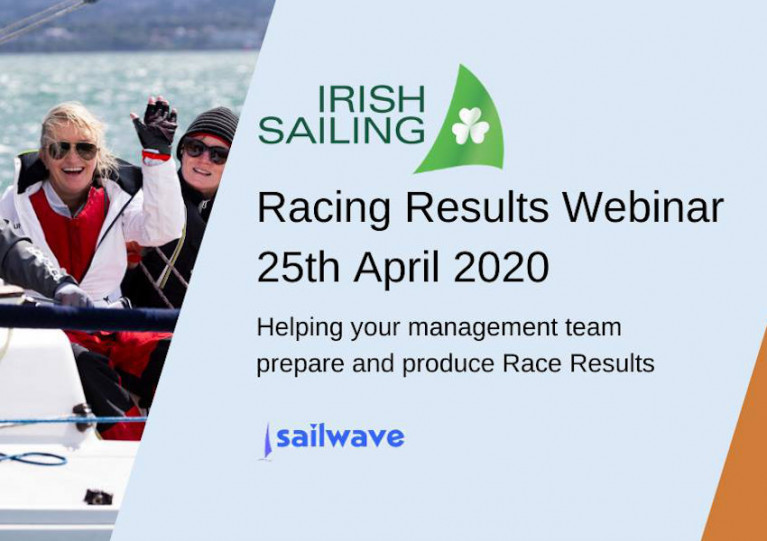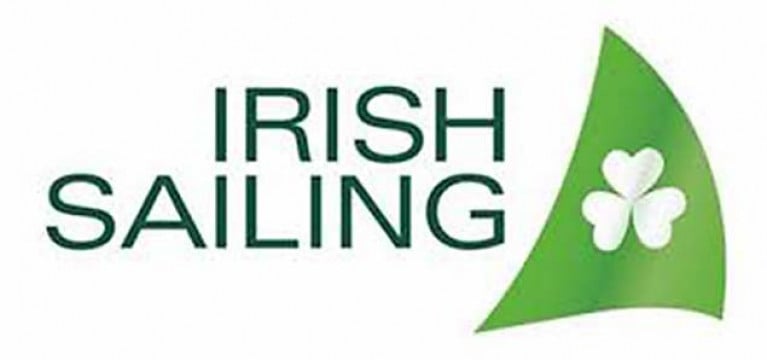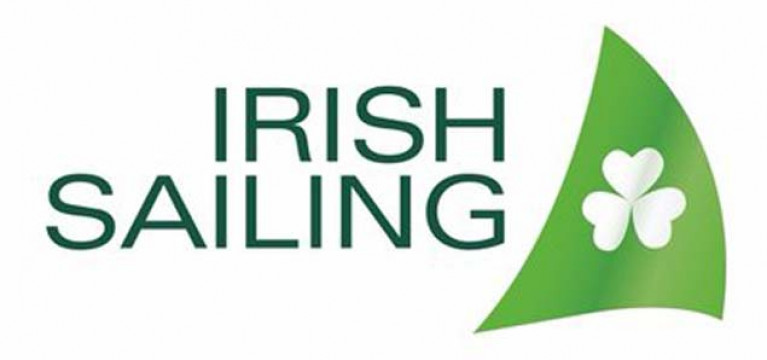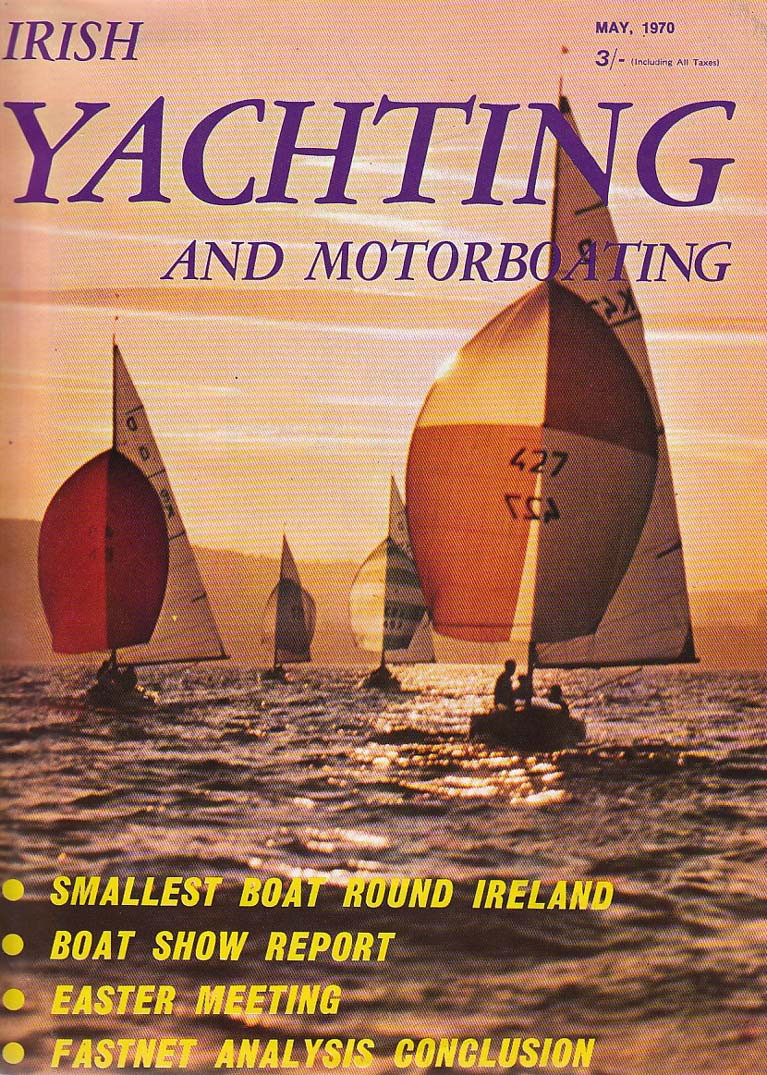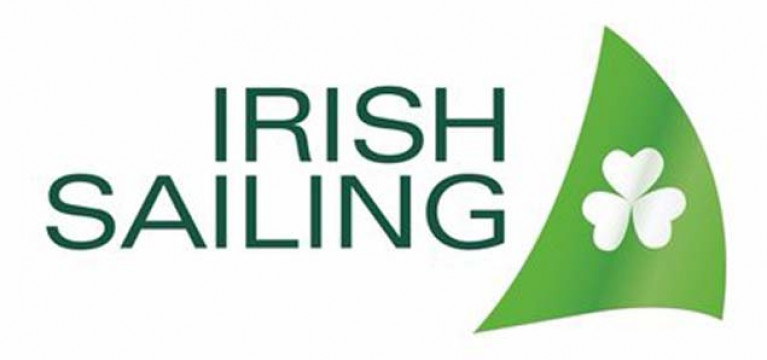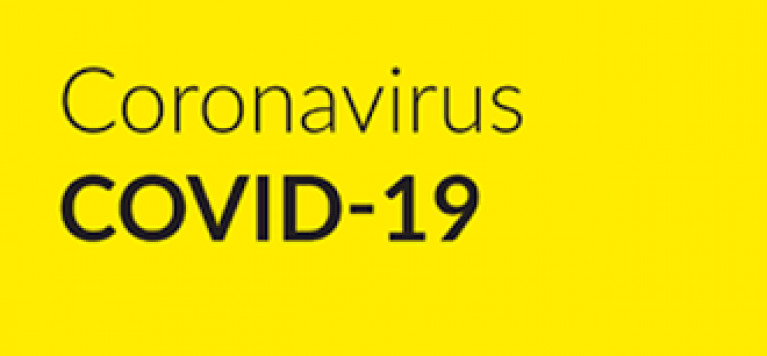Displaying items by tag: Irish Sailing
Covid-19 Fundraising Scam in Name of Irish Sailing
It has come to the attention of Irish Sailing that an email is circulating, seeking funds to support Covid-19 front line workers and is purporting to be from Irish Sailing’s President.
Please be advised this has NOT come from 'Irish Sailing' or 'David O'Brien' and if you receive such an email it should be ignored.
Book Now For Irish Sailing’s Umpire Webinar This Saturday
Umpiring is the subject of Irish Sailing’s latest webinar via Zoom, this Saturday 2 May.
Delivered by international umpires Cxema Pico and Chris Lindsay, the three-hour course from 10am is for anyone interested in team racing and becoming an umpire or coach, or simply for anyone looking to develop their knowledge of sailing rules.
Book your place in this Saturday’s webinar for just €1 with Irish Sailing HERE.
Irish Sailing Submit 'Return to Sailing' Document to Government
Since the Covid-19 shutdown commenced, Irish Sailing has been communicating on behalf of our members with various government stakeholders to present a case for our sport to be viewed as a ‘low risk’ activity, so that we will be allowed to return to sailing as quickly and safely as possible as restrictions start to be lifted. We believe that with appropriate measures, a basic level of safe and responsible activity can be delivered to get our members active on the water.
To this end, we submitted a proposal to Sport Ireland (the Government’s agency coordinating a return to sport activities) outlining protocols and priorities in a “Return to Sailing Scheme” document. As our members know, it is a fundamental principle of sailing that the decision to go afloat both for individuals and activity organisers is based on a combination of self-responsibility and risk assessment. The Return to Sailing Scheme proposed by Irish Sailing extends these principles to include the mitigation of Covid 19 risks to allow individuals and activity organisers make informed decisions on their own interests and activities.
Irish Sailing believes that limited activities can take place even within current guidelines, however, there are some measures that were included in our submission for the lifting of restrictions that we feel would significantly facilitate boating activities. These include:
- Irish Sailing Clubs and Accredited Training Centres allowed to organise activities in compliance with National guidelines
- Social gatherings of two (or more) households permitted to enable double handed sailing
- 2km limit for exercise extended to allow travel to the venue
- Public marinas and boat maintenance facilities open to allow essential access, lifting and maintenance
- Over 70s who are currently cocooning allowed access to their boats to facilitate their health and well being
- Access for boat owners to maintain their craft and minimise damage of facilities and property in case of storm or bad weather
Whilst there is currently much media coverage around the lifting of restrictions, and an announcement to be made in the coming days which is causing some confusion and speculation, Irish Sailing can only respond to official announcements, and we will communicate any options for returning to sailing activities as and when they are announced.
At this challenging time for all, Irish Sailing is focused on getting our members active on the water as soon as is safely possible. Members will be first to hear when this possible.
Harry Hermon, CEO, Irish Sailing
David O'Brien on His First Month as Irish Sailing President
Yesterday marked my first month as President of Irish Sailing.
My election as President came about in the most surreal of circumstances, at an AGM on 21st March attended only by Jack Roy as outgoing President and Harry Hermon as CEO, and my election being completed with the aid of proxy votes formally sent in by clubs. Since then the country has gone into a much more restrictive mode with all unnecessary travel and all sporting activities cancelled, including access to the water, marinas and clubhouses.
I am in lockdown in Crosshaven. My usual walking route draws me to the RCYC clubhouse and its marina, as well as past the other two marinas and three boatyards in the village. It is heartbreaking in this glorious weather to see the marinas and boatyards devoid of human activity, when we would expect feverish scraping, sanding, painting, the sound of drills whirring and motors churning up the water. Instead nothing – only flat water sparkling and the sounds of seagulls fishing.
My own boat was antifouled, engine serviced, and back in the water by St Patrick’s Day. But thereafter it has bobbed gently, tied to the marina with not even the engine turned over. This frustration I know is replicated by sailors all around the country.
Harry Hermon and the team at Irish Sailing are operating behind closed doors and working remotely. They continue to provide a continued service to facilitate an immediate resumption of the sport and at present, the team are drawing up proposals for Sport Ireland outlining how we could adapt activities and return to the water as quickly as possible. We will keep you updated.
A few weeks ago, I joined Harry and the team in a series of video conferences with Commodores and other officers representing 37 clubs to update them on a number of current issues, and this proved an efficient and well-appreciated modus operandi that can and will be easily and regularly repeated.
Likewise, the new Board will be holding our first meeting by video conference next week. This video technology has suddenly mushroomed all around us and opens up an enormous opportunity for people to engage remotely, and actively participate in committees, without the need to have to drive long distances to do so, especially in winter or dark wet evenings. We will be doing much more of this in months and years to come to the benefit of everyone.
The Irish Sailing website holds much information on the current pandemic here, with regular updates posted there and sent out by email to Clubs and members. In addition, there are a number of shore-based activities on the site to occupy and challenge the mind here. We have also invested in the Irish eSailing National Championship to get us sailing from the couch here.
Hopefully, May 5th will give us all some comfort and indication as to the rest of the season. Meanwhile, stay safe and continue to follow the guidelines.
Irish Sailing Hosts Free Racing Results Webinar This Weekend
Irish Sailing is hosting a free racing results webinar this coming Saturday 25 April from 10am.
Hosted by Ian Bowring and Dara Totterdell via the video conferencing platform Zoom, the three-hour webinar is designed to help you:
- become fully confident in setting up a results office;
- gather all the information you need to produce good results;
- learn how to use Sailwave results software; and
- stand proud in front of a full clean set of results within a short time of the race finish.
To register for this free seminar, email [email protected]
Covid-19 Update – Irish Sailing Drawing Up Proposals for a Return to Sailing When Restrictions are Lifted
Since the Taoiseach announced full restrictions and closure of clubs and activity centres last month, with the latest update being the continuance of full restrictions until at least May 5th, Irish Sailing has been looking ahead to the process by which we might be in a position to return to the water, and start organising activities once more. The way in which different people access sailing and boating both recreationally and competitively is very varied, and we need to ensure all aspects of the sport are included in any plan to return. We are now working on proposals that will be submitted to Sport Ireland outlining how we might be in a position to adapt our activities in order to remain compliant with restrictions as they are lifted. We will keep you updated.
Harry Hermon, CEO, Irish Sailing
A total of 37 Category One Irish Sailing Clubs attended a series of virtual meetings hosted by Irish Sailing. The aim was to introduce David O’Brien – Irish Sailing’s new President, to communicate further updates and clarify existing matters arising from COVID 19 restrictions and to share information, ideas and challenges common to Clubs.
The main challenge is the uncertainty of the period for which restrictions are likely to be imposed, making it difficult to plan ahead.
The updates are posted on Irish Sailing’s Corona Virus webpage that has been reorganised to give more structure around current restrictions, training briefings, and government supports for SMEs and Clubs.
The main issues discussed were:
- Sailing Activity - Whether members are allowed access to their own boats on club premises and the rescheduling of lift in. The consensus was that few (if any) clubs are allowing any sailing activity to take place from their premises until restrictions are lifted.
- Deferral of Irish Sailing Affiliation/Accreditation fees – Irish Sailing has agreed to a deferral of any fees unpaid to date until the end of May. This may be reviewed again should restrictions continue.
Membership Renewals – Many clubs reported a reluctance of some members to renew their subscriptions, particularly those who join to allow their children to attend the junior training course in the summer. It was suggested to allocate places on summer courses on a first come first served basis to encourage bookings and membership renewal. - When should Clubs be planning to reopen for activities – the advice was that Clubs might continue to plan with the assumption that they will resume at the beginning of the summer, however, to be prepared to defer or cancel activities if necessary (plan for the best, prepare for the worst).
- eSailing – Irish Sailing is to launch the eSailing National Championships this week.
- Sailing Calendar – Irish Sailing asked for organisations to submit any changes to the scheduling of events, so we can keep the sailing calendar as up to date as we can, and for organisations to look at the calendar prior to rescheduling to avoid clashes as much as possible. For example, the HYC Wave regatta has now been rescheduled for September, and the ICRA Nationals may be rescheduled as part of it.
- Lifting of restrictions – Irish Sailing will continue to monitor closely and communicate as restrictions are lifted. The expectation is that Sailing will be able to resume activities before some of the other contact sports, and that we will need to be ready to be active again without delays.
Chief Executive Harry Hermon concludes “The general feeling was the main challenge is the uncertainty of the period for which restrictions are likely to be imposed, making it difficult to plan ahead, but when we are allowed back on the water again, Sailing will be ready. “
Irish Sailing Life in the Rare Old Times
Once upon a time, when life followed some sort of a plan, Irish sailing was getting into early action in April. In looking back at Irish Yachting & Motorboating – the predecessor of Afloat.ie – for the editions of April and May 1970, we find that at this time of the year it was all systems go for putting in place a fund-raising Boat Show at the RDS in Dublin, and then at Easter, the dinghy classes gathered for the long-established Easter Meeting – inherited from the Irish Dinghy Racing Association - which for 1970 was staged in Wexford.
The 505s were the stars of the fleet, though the Fireballs were doing mighty well too, and in the 505s the winner was Wic McCready crewed by Nevile Lindsay racing Miss Betty V, which had previously been owned by Clayton Love Jnr.
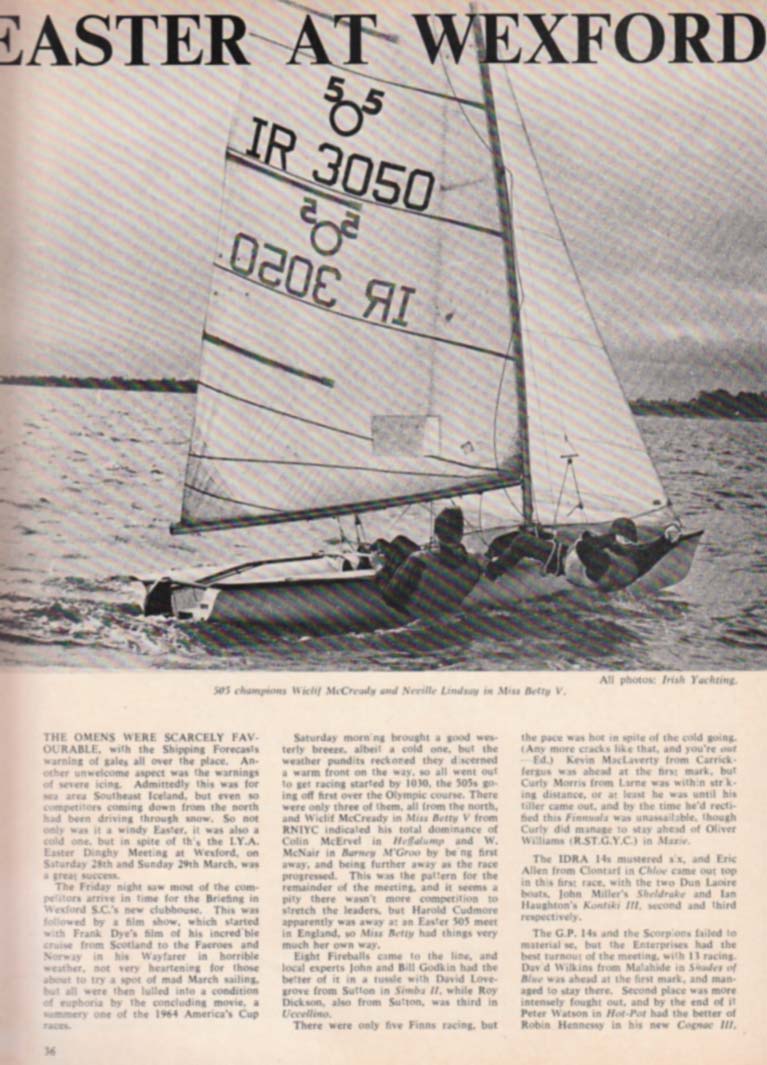 Wic McCready and Neville Lindsay powering along to 505 victory and the lead photo in IY & MB’s report of the 1970 Easter Meeting at Wexford. Photo: W M Nixon
Wic McCready and Neville Lindsay powering along to 505 victory and the lead photo in IY & MB’s report of the 1970 Easter Meeting at Wexford. Photo: W M Nixon
Following the Government’s “Stay At Home” for two weeks announcement, the Irish Sailing office will be closed and some of the Irish Sailing services will be unavailable.
Irish Sailing staff will all continue to work remotely and are available on email and mobile – our contact list is here
Irish Sailing: Clubs to Close, All Sporting Events Cancelled
In a press conference yesterday, An Taoiseach Leo Varadkar outlined tighter restrictions to tackle the Covid-19 emergency.
In his statement, Mr Varadkar said that “all sporting events are cancelled including those behind closed doors”. He also stated that from midnight tonight “theatres, clubs, gyms, hairdressers, libraries and other similar outlets are to shut”, and that we should only leave home if essential.
These restrictions will be in place until at least 19th April and will impact hugely on us all but as ever, the health and safety of the sailing community is of paramount importance.
Although the latest advice means that the Irish Sailing office at Park Road is closed to the public, we continue to work remotely, and we’re here to answer any questions you have.
Please call us on 01 280 0239.
You can read the full text of the Taoiseach’s speech here
You can read the HSE guidelines here:
All Irish Sailing’s updates can be found here



























